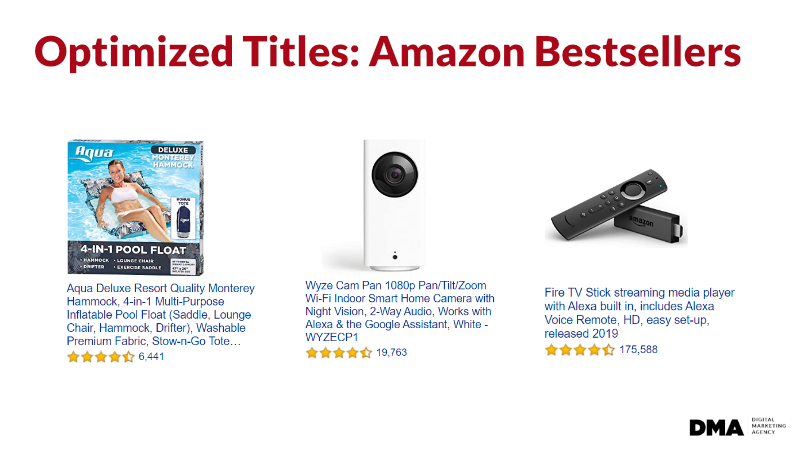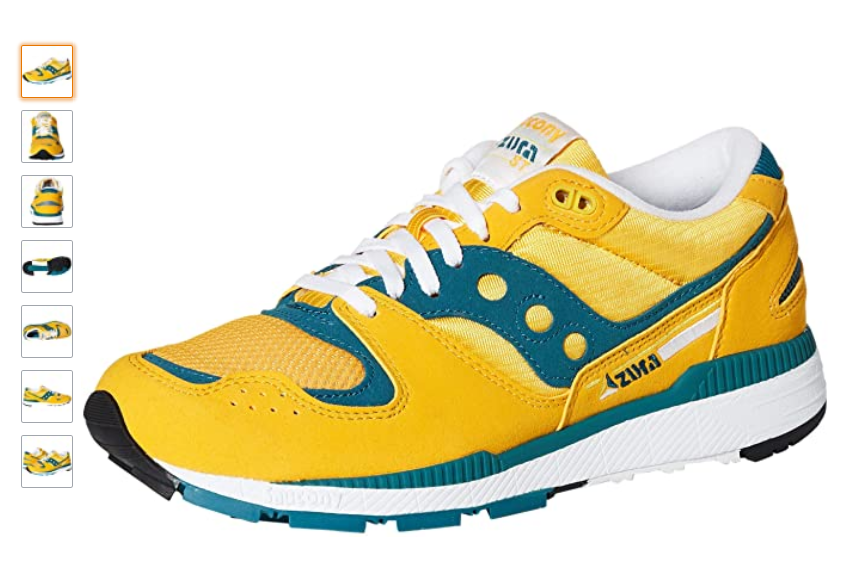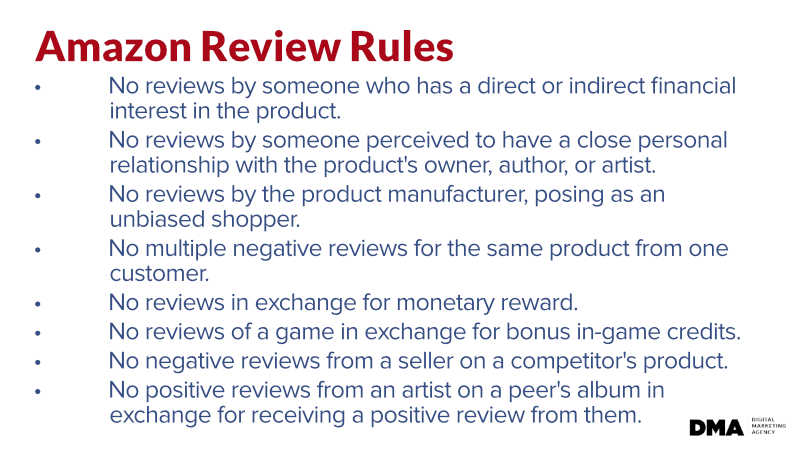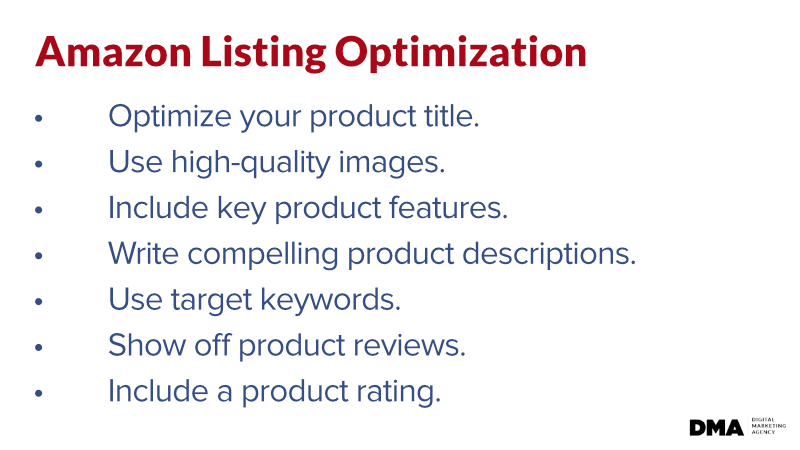SEO
Free SEO Analysis
SEO Services
Content Marketing Services
Local SEO
Link Building Services
Specialized SEO Services
PPC
REPUTATION MANAGEMENT
Free Reputation Management Analysis
Reputation Management Services
Review Management Services
Specialized Reputation Management Services
CEO Reputation Management
Brand Enhancement
Business and Directory Listings
Comprehensive Reputation Management Audit
SOCIAL MEDIA
Free Social Media Analysis
Specialized Social Services
WEB DEVELOPMENT
Free Website Analysis
Web Design Services
Mobile Development Services
Website Maintenance Services
Specialized Development Services
MARKETING AUTOMATION
Free Marketing Automation Analysis
Specialized Marketing Automation Services
Comprehensive Marketing Automation
INDUSTRIES
ABOUT DMA
SEO
How To Boost Sales With Amazon Listing Optimization
Request a quote
Its Fast, Easy & Free
Executive Summary
- Amazon’s product listings include seven different areas for optimization
- Your product title is the most important piece of text in your product listing. Amazon shoppers want a title that grabs them emotionally.
- Amazon is a shopper-based search engine. If you want to make sure that shoppers are finding your products when they search, these Amazon listing optimization tips will help you do that.
It’s not enough to find just the right product to sell on Amazon. Even a high-demand product isn’t going to sell if it’s not getting seen by interested buyers.
But what if you’re one of the 29% of Amazon sellers that find it challenging to create an optimized listing? Are you just out of luck, forever relegated to hawk your wares buried deep underneath other, better-optimized products?
Not if we can help it!
In this article, you’ll find actionable ways to optimize your Amazon listings to increase sales.
What Is Amazon Listing Optimization?
Amazon listing optimization is the process of optimizing your product pages to improve search visibility, click-through rates, and conversion rates to generate more sales.
This involves things like keyword discovery, optimizing your copy and images, and increase the number of reviews on your products.
Don’t worry, we’ll cover how to do each of those things and more—keep reading!
Amazon Listing Optimization
Amazon’s product listings include seven different areas for optimization:
Product title
Product images
Key product features
Product description
Keywords
Product reviews
Product rating
Each of these areas should help the buyer decide if they want to purchase your product or not. The different components come together to create a unique, search-friendly listing that makes your product shine.
Let’s take a look at how you can leverage each of these areas to create a great Amazon product listing.
Optimize Your Product Title
Your product title is the most important piece of text in your product listing. With such a short piece of text, you’d probably think that it’d be really easy to optimize.
It’s not.
While the Amazon platform loves straightforward, descriptive titles with keywords heavily represented, Amazon shoppers want a title that grabs them emotionally and convinces them that your product can make their lives better, happier, and easier.
Oh, and they don’t want you to sell to them.
Here are three examples of optimized titles from Amazon’s Bestsellers lists:

What makes these titles stand out? Let’s take a look at one of our examples:
“Fire TV Stick streaming media player with Alexa built in, includes Alexa Voice Remote, HD, easy set-up, released 2019”
The product’s name, “Fire TV Stick,” is right up front, letting shoppers know exactly what it is they’re looking at.
After that, shoppers can see several different features and characteristics about the product that will help them make a decision: “streaming,” “Alexa built in,” “Alexa Voice Remote,” etc.
Even though the titles are much longer than you normally find in high-quality copy, the titles work on Amazon. On Amazon, a great product title incorporates:
Short, but descriptive copy
How the product can help
Short and longtail keywords
Clear syntax with clean grammar
Incorporating these four elements will help you win over potential customers and let the Amazon algorithm navigate your listing easily.
Use High-Quality Images
High-quality images are vital to your product’s success on Amazon. Here are a few ways you can optimize your images to wow shoppers:
Use images that are sized at least 1000x1000px
Keep an image ratio of 1:1
Images should fill 85% or more of the image and the full product should be featured
Main/hero image background should be pure white
Include multiple images to show multiple product views
Show the product in use
Use graphics to show product descriptions and additional information
Here’s an example of an optimized image on Amazon:

Include Key Product Features
Now that you’ve optimized your product title and images, it’s time to make sure that your product features are displayed in a clear and easy-to-understand way that attracts and informs shoppers.
Here’s how to make sure that your product’s key features encourage purchases:
List features in order of importance to shoppers. The features that are most valuable to shoppers should be at the top of the list.
Highlight features that make your product stand out from the products of your competitors. Since shoppers will likely scan the product features first, these differences will be important to their purchase decision.
Include long-form feature lists so you can include the keywords that are important to shoppers and your product.
Include at least one example of how your product will solve the problem your customers need it to solve.
Detail your product guarantees to ease shoppers’ minds.
Each of your products, no matter how similar, should have a unique list of features and should include keywords that you want your product to rank for.
Write Compelling Product Descriptions
In addition to a list of product features, you’ll want to create a unique product description as part of your Amazon listing optimization.
Since Amazon product descriptions have a max length of 2,000 characters, you have limited space to really sell your product. Here are some Amazon product description best practices you can use to boost rankings in search results:
Write in a narrative format about product features and use cases
Include warranty information, dimensions, care instructions, and other useful information
Use target keywords naturally
Add company information like seller name, contact information, and website
Write in complete, grammatically correct sentences

As you can see, product descriptions show up lower on the product page. This means that customers who have made it down to the description are interested in your product and want to learn more.
A great way to build a product description that grabs attention is by checking out what your competitors have done. If you offer free shipping or guarantee your products, but your competitors don’t, that’s something you’ll want to note in your product description.
Also, don’t forget to highlight the ways your product solves the problems shoppers are having and how your product will help them solve that pain point.
Use Target Keywords
We’ve mentioned keywords a couple of times so far. Keywords are important for Amazon listing optimization because they tell Amazon and other search engines what your product is and signals to them how it should be ranked.
You don’t want your products to get lost in the hundreds of thousands of products that are on Amazon, right?
Including keywords in your product title, key features, and product description is one of the best ways to get Amazon’s A9 algorithm to link your product with those keywords.
Another great way to incorporate keywords into your product listings is by using Amazon search terms
Here are some ways to get the most out of Amazon search terms:
Stay under length limit (250 bytes)
Include synonyms
Include spelling variations, no need for misspellings
Include abbreviations and alternate names
You can use all lower case
You don’t need punctuation, such as: ";", ":", "-"
Separate words with spaces
Don’t repeat words within the Search Terms field
Don’t include your brand or other brand names in Search Terms
Don’t include ASINs in Search Terms
No need for stop words such as “a,” “an,” “and,” “by,” “for,” “of,” “the,” “with,” and so on
Use singular or plural, no need for both
No temporary statements such as “new,” or “on sale now”
Don’t use subjective claims, such as “best,” “cheapest,” “amazing,” and so on
Don’t add abusive or offensive terms
How to Find Keywords to Target
There are keyword research tools you can use to find keywords. Choose the best keyword research tools for you and start searching.
Once you have a decent list of keywords, get rid of the duplicates and the ones that don’t actually relate to your product.
You’ll end up with a list of relevant short and longtail keywords that you can then include both in your product listing and in Amazon search terms.
Show Off Product Reviews

Product reviews are an excellent type of social proof that gives you tons of credibility with shoppers. If you can get more positive reviews from verified purchases that contain relevant information, you’re golden.
Reviews are hard to get. In fact, many customers won’t leave a review unless they’re upset with your product or your brand.
Amazon has some pretty specific rules on what reviews are not allowed:
No reviews by someone who has a direct or indirect financial interest in the product.
No reviews by someone perceived to have a close personal relationship with the product's owner, author, or artist.
No reviews by the product manufacturer, posing as an unbiased shopper.
No multiple negative reviews for the same product from one customer.
No reviews in exchange for monetary reward.
No reviews of a game in exchange for bonus in-game credits.
No negative reviews from a seller on a competitor's product.
No positive reviews from an artist on a peer's album in exchange for receiving a positive review from them.
So, how do you get more positive reviews?
The best way to get more positive reviews is through excellent customer service. Spoil your customers with fast shipping, no-hassle returns and exchanges, and by being available for questions and support when needed.
You can also use marketing automation to send out requests for reviews. Keep in mind that you can’t offer a bribe in exchange for reviews, though.
Include a Product Rating
Product ratings and product reviews are intertwined. Typically, the more positive reviews, the higher the ratings.
Amazon calculates a product's star rating using machine-learning models instead of a simple average. The models they use look at things like how recent the rating or review is and whether or not it has verified purchase status.
Amazon uses multiple criteria to confirm the authenticity of the feedback and the system continues to learn and improve over time.
They don’t consider customer ratings without an Amazon Verified Purchase status in a product's overall star rating unless the shopper has included more details in the form of text, image, or video.
To improve your product ratings you can analyze your negative reviews. Look for patterns and consistencies in the reviews. This will show you the things that your customers don’t like so you can fix them.
Boost Sales With an Amazon Listing Optimization Service

Amazon is a shopper-based search engine. If you want to make sure that shoppers are finding your products when they search, these Amazon listing optimization tips will help you do that.
Amazon Seller Central gives you many options to add content and include relevant keywords in your listings: headlines, product descriptions, images, bulleted feature lists, and backend fields.
To get the most from your Amazon store you need to use all of the tools at your disposal.
Spending time on Amazon listing optimization will not only help you drive more traffic to your products but you’ll also be able to convert more of those visitors into customers.
As you continue to convert better, you’ll see even great traffic increases. This is because Amazon rewards listings that convert well by ranking those results higher in search results.
Remember, Amazon wants you to be successful and make money because they’ll make money, too.
Feeling overwhelmed with everything you need to do to keep your Amazon listings optimized? Hire an Amazon listing optimization service to take care of it for you.
Digital Marketing Agency can help you get your products sold on Amazon and increase your sales. Contact us today for a free consultation and have an edge on Amazon tomorrow.
Our Sales team